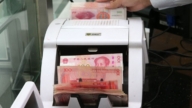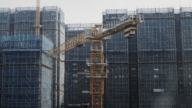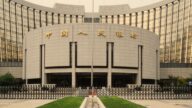【新唐人2014年07月26日訊】目前在中國大陸「資產證券化」產品,時隔7年再現江湖,各銀行、金融機構,甚至就連國營企業都在爭相發行「資產證券化」產品。官方媒體就此發文,嚷嚷可以期待信貸資產證券常態化。不過外界認為中國金融界的這一舉動,是在中國經濟處於嚴重脆弱時,中共當局企圖從老百姓的腰包中掏出最後一個子的歪招。
7月22號,中國郵政儲蓄銀行,發行的人民幣68億元「住房抵押貸款支持證券」正式上市,同一天招標發行的,還有中信銀行61億元的資產支持證券化產品,和臺州銀行的5.3億資產支持證券化產品。
所謂「資產證券化」,就是把那些缺乏流動性,但具有可預期收入的資產,以發行證券的方式予以出售,來獲取融資。
大陸《金融時報》7月22號發文,為「資產證券化」叫好。文章說,近期「資產支持證券」產品的發行人,已經從國家開發銀行、大型商業銀行等,擴展到城商行、汽車金融公司等,「基礎資產」也涉及了個人住房貸款、汽車抵押貸款等多個類別。標誌著中國信貸資產證券化,逐步向所謂常態化邁進。文章還引用多個專家的話,論證所謂的「資產證券化」如何可靠。
美國南卡羅萊納大學艾肯商學院教授謝田:「這實際上是一個明火執仗的搶劫,中國金融證券處於一個非常脆弱的地步,中國政府還在大量推這些東西,從券商到媒體到政府到發行商,都是統一口徑的吹捧叫好,人們並不能夠真正清醒的認識到,資產支持證券的風險在哪裏。實際是在公然欺騙中國的百姓。」
「資產支持證券」,又稱「ABS」。它將公司的特定資產或某項現金流,作為融資抵押資產,而不是以公司整體名義來融資,因此減少融資成本,也可以限制償債風險。
與股票和一般債券不同,「資產支持證券」不是對某一經營實體的利益要求權,而是對「基礎資產池」(pool of underlying assets)所產生的現金流和剩餘權益的要求權,是一種以資產信用為支持的證券。
因而「資產支持證券」產品相關的本金支付時間,具有不可預見性。
大陸企業觀察家何軍樵:「因為現在整個金融業是非常腐敗的,也是非常黑暗的,資產證券化無非就是甩包袱,就是希望這些負債的資產由當地的老百姓去承擔,企圖將這些債務轉嫁到老百姓身上,反正中央政府沒辦法了就想辦法,這都不是正道。」
中國2005年開始允許「ABS」試點時,受到了廣泛抨擊,2009年「ABS」項目不得不停止。2012年中國又重新啟動了這個項目,並逐步擴大規模。
中國支持「ABS」理論者,是以美國等西方國家早就有了「ABS」為理由。
謝田:「美國也有很多金融產品、證券產品,是由私人公司來進行的,美國政府恰恰是在起一種監督和檢查的作用,完完全全徹底的披露所有的風險,一旦政府發現券商有欺詐行為,政府會直接起訴,政府沒從中獲利,實際上是保護消費者的權益的,在中國恰好相反,媒體也幫著欺騙。」
根據國際「渣打銀行」(Standard Chartered)大中華區研究部主管王志浩(Stephen Green)的估算,到今年6月底,中國總債務與國內生產總值(GDP)之比,已經達到251%。
而中國國內債務到期無法償還的現象也在不斷湧現。例如,山西「華通路橋集團」的4億元債務,在7月23號到期,面臨違約,最終由山西省政府親自出面干預,才完成債務償付。這個集團在上半年也曾出現超日債違約,同樣由政府出面兜底。
近期,更多的實質違約債券爆出,7月10號,由浙商證券承銷的「12金泰債」遭遇本息無法兌付。據國內媒體報導,有590億民企債務出現兌付危機。
那麼,這些債務最終由政府出面以印製鈔票方式解決,導致通貨膨脹,誰才是受害者呢﹖
採訪編輯/劉惠 後製/鍾元
Asset Securitization Appears Again
Expert: Risk is Shifted to the People
Asset securitization products appear in China again
after an interval of 7 years.
Banks, financial institutions, and state-owned
enterprises are scrambling to release asset securitization
products.
The official media demanded the normalization of credit
asset securitization.
It’s believed to be the last trick to pull the last money out of
the people from Chinese Communist Party (CCP) in such
seriously vulnerable economic conditions.
July 22, China Postal Savings Bank issued mortgage securities
to the value of 6.8 billion RMB.
The same day, the CITIC Bank issued asset securitization
products of 6.1 billion RMB by tender and Taizhou Bank
issued asset securitization products worth 530 million RMB.
Asset securitization is to sell assets which
lack liquidity but with predictable income by issuance of
securities to obtain finance.
July 22, mainland Financial Times issued an article to boost
asset securitization.
The article said that recent asset securitization product
issuers have moved from the National Development Bank,
large commercial banks to the city commercial banks, auto
finance companies, etc.
The underlying asset also involves multiple categories
including individual mortgages, and car loans.
It means China credit asset securitization gradually moves
to so-called normalization.
The article also cited a number of experts to demonstrate
how reliable this so-called asset securitization is.
Professor Xie Tian, University of South Carolina
School of Business: “this is actually blatant robbery.
Chinese financial securities are at a very vulnerable point;
but the Chinese government is still puffing it up.
Security traders, the media, the government are united
in their applause.
People cannot truly understand the risk of asset-backed securities.
It’s actually a blatant fraud on the Chinese people."
Asset-backed securities are also known as ABS.
It uses a specific asset or a cash flow as mortgage assets for
finance, rather than the overall company finance.
Thereby, it reduces financing cost and limits debt risk.
ABS is different from stocks and bonds, it doesn’t claim
on the interests of a specific operating entity, but claims
on the cash flow and residual interest generated by the pool
of underlying assets.
It is kind of stock supported by asset credits.
Thus, principal payment time for ABS related products
is unpredictable.
He Junqiao, mainland corporate observer: “Asset securitization
is nothing more than dumping the burden to let people take
the debt as the whole financial industry is corrupt and dark.
The attempt is to shift these debts to the people
so the central government would have a way out.
It is not the right way."
The ABS pilot program has been widely criticized since it
started in 2005.
In 2009, the ABS project had to be stopped.
In 2012, China restarted the project and gradually expanded it.
The reason that someone supports ABS in China is because
the US and other Western countries have used it for a long time.
Xie Tian: “There are a lot of financial products,
securities products used by private companies in U.S.
The US government precisely takes the supervision and
inspection role to completely disclose all risks.
Once the government finds fraud from the securities
trader, the Government will directly prosecute without profit.
It is in fact to protect the interests of consumers.
The Chinese government is just the opposite.
The media also helps to deceive. “
According to the head of the Greater China research team in
Standard Chartered Bank Stephen Green’s estimate, by the end
of this June, China’s total debt has reached 251% compared to
gross domestic product (GDP).
There are lots of due debts can not be paid in China.
For example, the Shanxi Huatong Road & Bridge Group Co.
400 million yuan of debt expired on July 23 facing default.
Eventually, the Shanxi provincial government intervened to
complete debt repayment.
There was other debt default in the first half year and the government
also came out to solve it.
Recently, more essential default debts were exposed.
July 10, 12 Jintai debt which is underwritten by Zhejiang
Securities could not pay the principal and interest.
According to domestic media reports, 59 billion private
enterprises’ debt payments are in crisis.
These debts were solved by the government through printing
money which resulted in inflation.
Who is the real victim?
Interview & Edit/Liu Hui Post-Production/Zhong Yuan























